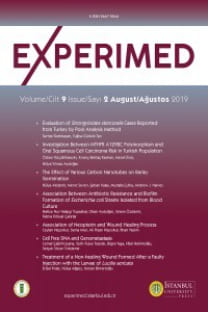Evaluation of the Anti-Inflammatory Impact of Vitamin D on Polycystic Ovary Syndrome and Endometriosis
Vitamin D deficiency, Inflammation, NLR, PLR PCOS, Endometriosis,
___
- 1. Holick, M.F., High prevalence of vitamin D inadequacy and implications for health. Mayo Clin Proc, 2006. 81(3): p. 353-73.
- 2. Aygun, H., Vitamin D can prevent COVID-19 infection-induced multiple organ damage. Naunyn Schmiedebergs Arch Pharmacol, 2020. 393(7): p. 1157-1160.
- 3. Grudet, C., J. Malm, A. Westrin, and L. Brundin, Suicidal patients are deficient in vitamin D, associated with a pro-inflammatory status in the blood. Psychoneuroendocrinology, 2014. 50: p. 210-9
- Yayın Aralığı: Yılda 3 Sayı
- Başlangıç: 2011
- Yayıncı: İstanbul Üniversitesi
İsmail Mert ALKAÇ, Murat İŞBİLEN, Barış KÜÇÜKKARADUMAN, Ali Osmay GÜRE, Burçak VURAL
Fatma KALAYCI YÜKSEK, Defne GÜMÜŞ, Gül İpek GÜNDOĞAN, Aysun UYANIK ÖCAL, Nur ELAGÜL, Mine ANĞ KÜÇÜKER
Şebnem GARİP USTAOĞLU, Birsen ELİBOL
Bertan Boran BAYRAK, Dastagul MAHMARZAYEVA, İsmet Burcu TÜRKYILMAZ, Özlem SAÇAN, Refiye YANARDAĞ
Gülseren DOST SÜRÜCÜ, Dilay EKEN GEDİK
Meriç Emre BOSTANCI, Onur AVCI, Ayça TAŞ, Tülay KOÇ, Sinan GÜRSOY, Yavuz SİLİĞ
Elif İŞBİLEN, Özge KÖMÜRCÜ KARUSERCİ
Gumrah SEYHAN, Unsal Veli USTUNDAG, Ismail UNAL, Perihan Seda ATES KALKAN, Derya CANSIZ, Ebru EMEKLİ ALTURFAN, Ata ALTURFAN
Otizm Spektrum Bozukluğu Olan Monozigotik İkizlerde Tüm Genom Dizileme Çalışması
